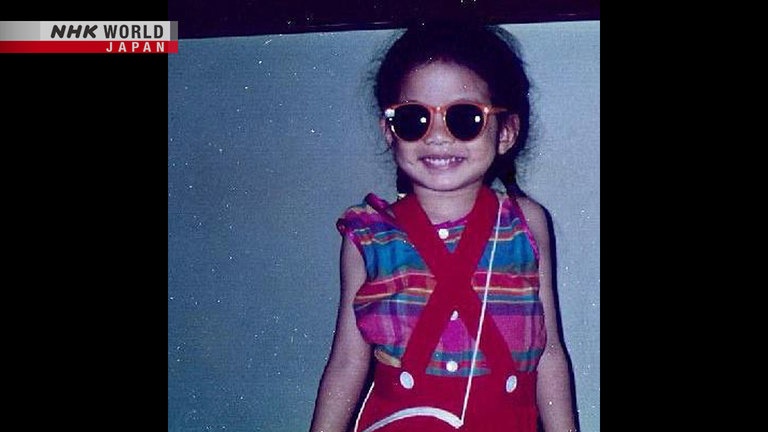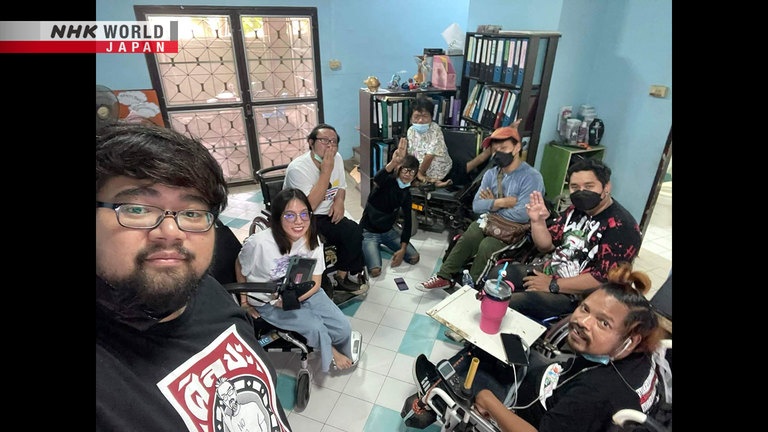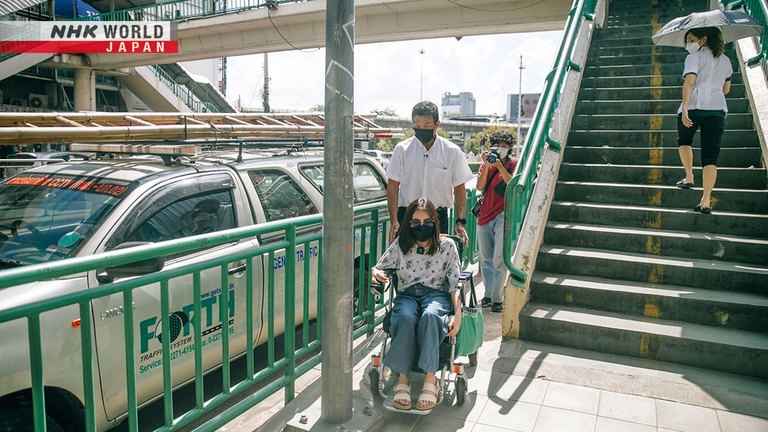Seeking True Equality: Nalutporn Krairiksh / Executive Editor, ThisAble.me
Thai journalist Nalutporn Krairiksh is the founder of ThisAble.me, a website about disabled people and disability rights. A disabled person herself, she seeks a society of true equality for all.



Transcript
Direct Talk
Bangkok, Thailand
In a small office
in Thailand's capital of Bangkok,
29-year-old journalist Nalutporn Krairiksh
is holding a meeting with her staff.
She has been disabled since childhood
and uses a wheelchair.
Nalutporn Krairiksh
Executive Editor, ThisAble.me
Together with her colleagues,
Nalutporn set up a news website
that covers issues of human rights,
social advancement, medical care, and
transportation for people with disabilities.
Can I get through?
It looks tough.
Let's go back.
But I think I'm stuck!
Let's lift the wheelchair.
1, 2, 3!
Even in Thailand, which is now one of the
largest economies in Southeast Asia,
there is not enough support
for the socially vulnerable.
There are still many barriers
that make it difficult for people
with disabilities to be heard.
Nalutporn launched the news website
"ThisAble.me" in 2016 with five colleagues,
to publish information from the
perspective of people with disabilities.
The site currently has about 60,000 followers.
In 2018, she received
the Human Rights Defenders Award
from Thailand's
National Human Rights Commission.
My site, "ThisAble.me," is like a forum.
We've gained trust from other Thai media,
and at last, they're starting to
report on disabled people
without diminishing our humanity.
This young journalist speaks out
from a minority's perspective,
determined to seek an equal society for all.
Seeking True Equality
Nalutporn currently runs
the news website "ThisAble.me,"
with three full-time staff.
They are supported by
outside translation staff
and more than forty interns.
On her website,
Nalutporn introduces disabled people
in Thailand with forward-looking lifestyles.
For example, a woman with autism
who is pursuing her dreams to become
Miss Thailand
or a music duo who have overcome
the hearing disability they were born with.
I don't want people with disabilities
to be pitied any more than necessary.
You know, comments like
"Wow, you graduated school
even though you're disabled!"
We want to present people with disabilities
as plain human beings.
We get a lot of questions
from other online media,
like, "Is it okay to use
this kind of expression?"
or "What kinds of things do people
with disabilities find inconvenient?"
I want to work with other platforms
to address such issues
without glossing over them.
Nalutporn was born in Bangkok in 1993.
She has a congenital disease
called spinal muscular atrophy,
known as SMA.
She comes from a middle-income family.
On his days off,
her father would take her on outings
such as to the swimming pool.
As a child, she didn't have anything
in particular to worry about.
But as she grew older,
she became more aware of "inequality."
To begin with,
people with disabilities in Thailand
don't have many educational opportunities.
The global standard is
that disabled students should have the same
access to learning as able-bodied students.
However, that's not the case
here in Thailand.
Many schools do not yet have a support system
for students with disabilities.
For example, if there was a child
who uses a wheelchair like me,
in practice there are hardly any
elementary schools that would enroll them.
The reason being that
schools don't have elevators.
Thai educators don't know how to
interact with people with disabilities.
Actually, even now, less than
half of Thailand's disabled children
are getting an education.
I was lucky enough
to go to elementary school,
but I also felt inequality.
You have dreams as a child, don't you?
My able-bodied friends had endless dreams
For example, they wanted to
become a doctor or a pilot.
But people told me not to say those things,
because I am in a wheelchair.
At that point, I was cut off
from what I wanted to be.
While wondering what to do with her life,
Nalutporn had an encounter
that changed her future.
She came across art.
In middle school,
there was a morning assembly every day.
But the teacher told me,
"It's hard for you,
so you can stay in the classroom."
Because there was no elevator at school.
But the art teacher would come
and teach me art every day.
It was so much fun.
And I felt that I was pretty good at drawing.
Faculty of Fine and Applied Arts,
Chulalongkorn University
Nalutporn was drawn into the world of art,
and studied traditional
fine arts in university.
She was worried about
her life after graduation,
but then, she had another fateful encounter.
I knew very well
that it would be difficult to find a job
after graduation with an art degree.
We don't learn graphic design
or video editing in fine arts,
so I had no practical skills.
In Thailand, it's hard for
oil painting majors to find work.
But I had some extra time,
so I decided to enroll in
a journalism training course.
One time, there was this practice exercise
to write news articles
about people with disabilities.
So I wrote about my own thoughts
on the problems and difficulties
faced by disabled people in Thailand.
But up to then
I'd never thought about
writing as a profession.
Yes I studied traditional
fine arts at university.
I didn't do any writing in the art courses
but during the training
in the journalism course,
I got the sense that by writing
I might be able to make a difference...
make an impact on people's lives.
For example, by giving a voice
to minorities who need help,
or, by introducing those who
want to say something to the world.
I felt that doing so
would be truly worthwhile.
I asked myself,
"Maybe I was born to be a writer?"
"Perhaps I could find my passion in writing?"
I wasn't sure of the answer,
but I was definitely sure that
it was something that someone must do.
After graduation, Nalutporn started work
as a writer at Prachatai,
an independent news website.
I started working at Prachatai as an intern.
My first assignment was on gender issues.
Actually, I really wanted to work
on disability issues.
But at the time, Prachatai hadn't gotten
around to seriously covering that topic yet,
so I worked mainly on gender diversity.
Although it seems that
the managers at Prachatai
did want me to work on
disability issues as well.
Even today, much of Thai society thinks
that there is always going to be
inequality in the world,
so people with disabilities will
unfortunately have to suffer inequality.
And that leads to the belief
that disabled people cannot live on
an equal footing with the able-bodied.
This is the key point.
Even when human dignity is at stake,
the government shows no will
to change political or societal structures.
Prachatai put me up front, I think,
because there was no one else
to seriously address disability issues
without glossing over the realities.
Meanwhile, other media outlets were reporting
really strange things as domestic news.
There was a news story that
"A disabled person
had married a beautiful woman."
I mean, what kind of news was that?
Someone simply got married.
Did they want to imply that
he had made the impossible possible?
So I made a decision.
I would create my own media outlet
and cover news myself.
After working at Prachatai
for roughly a year,
Nalutporn launched
her own news website in 2016.
That was the "ThisAble.me" website
which she set up with five staff,
including colleagues from Prachatai.
The website not only covers social issues,
but also, lifestyle and art from
the perspective of people with disabilities.
Nalutporn's knowledge in art came in useful.
The site is visually designed,
tying together photos, videos, and articles.
Her work is supported by
her previous employer Prachatai,
donations from followers,
and income from articles she writes
for other magazines and newspapers.
In 2020 her work reporting on human rights
was recognized with an award
from Amnesty International.
We want to fight against the conventional
thinking that the media puts out.
For example, people with disabilities
tend to be stereotyped as poor.
On TV, they often say,
"Disabled people need your donations."
I want to get rid of those conventional ideas
like blindly asking for money
for disabled people.
And I want to spread fresh views.
That's my mission.
Her website featured the example of
how a man in a wheelchair
with impaired arms and legs,
launched a successful online store
selling dairy products.
And if Nalutporn becomes
interested in something,
she always heads out onto the streets
to find out what is happening.
Compared to other cities around the world,
Bangkok is still a difficult place
to live for many of us with disabilities.
It's extremely hard for
disabled people to feel motivated
to participate in and contribute to society.
You can see how difficult life
is here in a wheelchair.
I hardly need to explain how bad
the sidewalks in Bangkok are,
even though it's the capital.
There aren't even any intersections where
able-bodied people can cross safely.
There are also large obstacles
for people that don't use wheelchairs
that have other disabilities.
For example, those with visual impairments.
I've visited Japan before,
and when I went, I saw that there was
"tactile paving" on the sidewalks.
Those paving blocks
let people with visual impairments
walk by themselves in Japan.
And I saw many people
walking on the streets using white canes.
In Thailand, it's impossible for people with
a visual disability to go out by themselves.
We have to start gradually
improving these things.
And that's the message
I am trying to put out there.
Nalutporn's colleague feels that
people are drawn to her leadership.
Kotcharak Kaewsurach
Content creator
Nalutporn runs our organization
But not only does she
manage the organization,
she goes out to report as well.
When we're on site,
I'm in charge of the camera,
but she puts up the tripod
and does everything she can.
She helps with the interviews
and works really hard.
She pays careful attention to her staff,
she's very approachable,
and is also a flexible thinker.
Future Forward Party Policy
for people with disabilities
In 2019, "ThisAble.me" published an article
on the launch of a
new political party in Thailand.
"How can we change society?"
With that thought,
Nalutporn became a member
of the Future Forward Party,
the new party launched by
the younger generation of Thailand.
She supported the party's stance
on improving rights for disabled people.
The party was disbanded in 2020,
mainly for supporting demonstrations
seeking to reform the Thai royal family.
But Nalutporn continues to do
more than just publish articles,
and is always looking to
take practical action.
Nalutporn Krairiksh
Executive Editor, ThisAble.me
How long do we have to wait
until people with disabilities are
treated properly by the legal system?
How long do we have to wait
until people with disabilities are seen
as proper members of society?
I don't believe that anyone is born
either above or below anyone else.
The number of social opportunities available
are a reflection of
how advanced a society is.
And I think it's a problem when we
separate people into different ranks,
because it leaves
disadvantaged people very vulnerable.
It is a structural issue in society.
It really shouldn't matter
where you were born,
what kind of body you have,
or what country's language you speak.
But I do have hopes for the kind of life
I want to lead in the future,
here in Thailand.
I want to have the sense
that people with disabilities can live
with the same dignity as other people.
Because Thailand is my home.
As someone born here,
I hope I can live happily here.
I hope I can live in an environment
that allows people with disabilities
to pursue happiness.
I hope to make this a place
where we can live comfortably,
without relying on others.
I'm not a complicated person.
Actually, I don't intend to work
on disability issues my whole life.
I hope that these issues
will be resolved quickly
and that I can move on.
I love animals
and sometime in the future, I'd like to do
something like look after animals.
I also love to travel and want to do that.
I don't want us to forget this principle.
We are born in different places
and circumstances
and have different colored skin.
But we are all human beings.
People are all equal